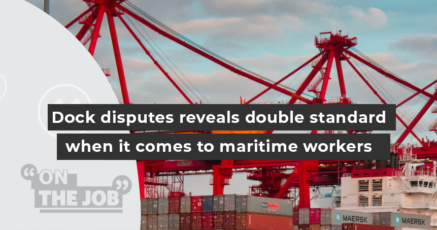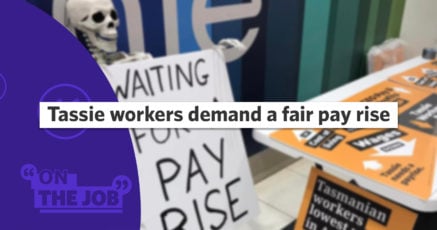Those old Bolshies at the International Monetary Fund (IMF) have been at it again.
“The COVID-19 pandemic has exacerbated pre-existing inequalities and poverty and has demonstrated the importance of social safety nets. It has also laid bare inequalities in access to basic services—health care, quality education, and digital infrastructure – which, in turn, may cause income gaps to persist generation after generation.”
The global financial powerbroker has just released its latest Fiscal Monitor Report and it calls for continued and sustained government spending in economies around the world to stave off the catastrophic economic consequences for working people if government stimulus were to end quickly.
“Policy responses should recognise that various aspects of inequality (income, wealth, opportunity) are mutually reinforcing and create a vicious circle,” the IMF report reads.
And it goes on, even daring to mention the T word – Tax.
“Advanced economies can increase progressivity of income taxation and increase reliance on inheritance/gift taxes and property taxation. COVID-19 recovery contributions and “excess” corporate profits taxes could be considered. Wealth taxes can also be considered if the previous measures are not enough. Emerging market and developing economies should focus on strengthening tax capacity to finance more social spending,” the IMF wrote.
The IMF is not known for its progressive outlook and has been used as a tool of instilling draconian free-market conditions to the loans it makes, particularly for emerging and developing economies.
So why has it suddenly come across all John Maynard Keynes and sounding like it has been cribbing notes from Australian Unions own National Economic Recovery Plan?
Meanwhile, Australian workers are being softened up by the Morrison government for a new round of austerity. As the IMF implores the world’s developed economies to continue to ensure government spending helps to stem the growth of poverty and inequality, Josh Frydenberg is set to turn off the tap and leave ordinary Australians to cope with his brand of discredited trickle-down economics.
Matt Grudnoff is Senior Economist with the independent think-tank the Australia Institute. He told On the Job that, unlike Scott Morrison and Josh Frydenberg, the IMF has learnt the lessons of the last, great global economic meltdown.
“I’m not surprised [by the IMF’s policy position]. I think that they’ve actually learned a lesson from the 2008 financial crisis, which was a rather large recession, particularly in Europe, and after that stimulus was pulled way too early, they suffered a major economic contraction,” Grudnoff said.
“They pulled their stimulus too early and the economies crashed, and what the IMF is really worried about is them doing that again. Cutting spending tends to cause these recessions. Essentially what they’re saying is ‘look if you have to engage in budget repair, at least engage into it by increasing taxation on high income earners.’”
With a culture of vehement opposition to any increase in taxes, the Australian Government is unlikely to welcome this latest IMF report which directly challenges its mantra of belt tightening and austerity.
It would be a difficult pill to swallow for the economic hardliners within the Liberal Party according to Mr Grudnoff.
“Unfortunately, that’s the case and that means either that it has to ignore its so- called budget repair about trying to reduce the budget deficit for a period of time to allow the economy to fully recover. Otherwise, they need to swallow their ideological problem with it in the same way they did with JobKeeper,” he said.
The IMF Fiscal Monitor report even conjures the spectre of a great lost opportunity for Australia – a resources rent tax.
This form of taxation is standard practice in all countries that rely on their natural wealth for their prosperity. Remember, you can only dig it up and ship it out once, so if you don’t make it work for the nation then, you never can.
This revenue mechanism of putting an impost on super-profits generated by primary resource industries like mining was demonised in Australia after a relentless campaign by billionaires such as Gina Reinhart and Andrew “Twiggy” Forrest.
And – sidebar here – no need to worry about whether these two can still afford to keep the lights on, both of these rent-seekers doubled their wealth in the last year as the rest of Australia struggled to keep the wolf from the door.
Not having a super-profits tax will ensure that the billionaires will continue to get filthy rich, whilst Australia locks in inequality and a low-wage, insecure future for the rest of us.
Matt Grudnoff believes whilst the politics of such move are difficult, the economic benefit is indisputable.
“If we just set aside the politics for a second and just look at the economics of a resource rent tax, it is the best possible tax you can have. If you create a super-profits tax then people are going to go about their business and continue to do exactly what they would have done before the tax,” explained Mr Grudnoff.
“Instead of those super-profits going to the owners of that business, who are mostly wealthy people, it goes to the government who can then use it in other ways.
“You don’t have to go far to see countries that tax their resources, far more cleverly than Australia. You can look at Qatar and countries like that, they have a resource rent tax as high as 80% and yet people are beating on their door to buy their oil and gas.
“They understand that the gas and the oil isn’t going to last forever. This massive windfall they had is a temporary one and if they tax it appropriately, then they’re able to build an economy that isn’t so reliant on oil and gas.
“Australia could do exactly the same thing. The iron ore is not going to last forever, the coal is not going to last forever. We need to be beyond that.”













SHARE:
The IMF gets it – so why doesn’t Scott Morrison?